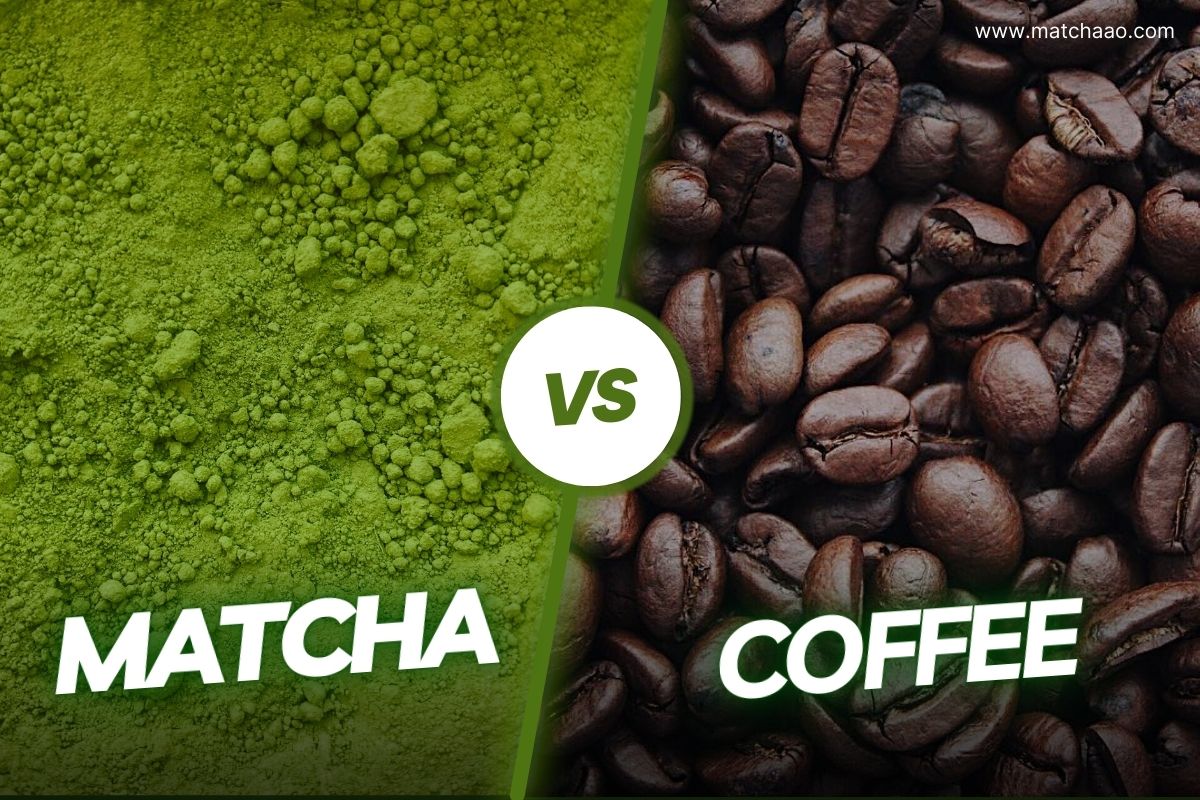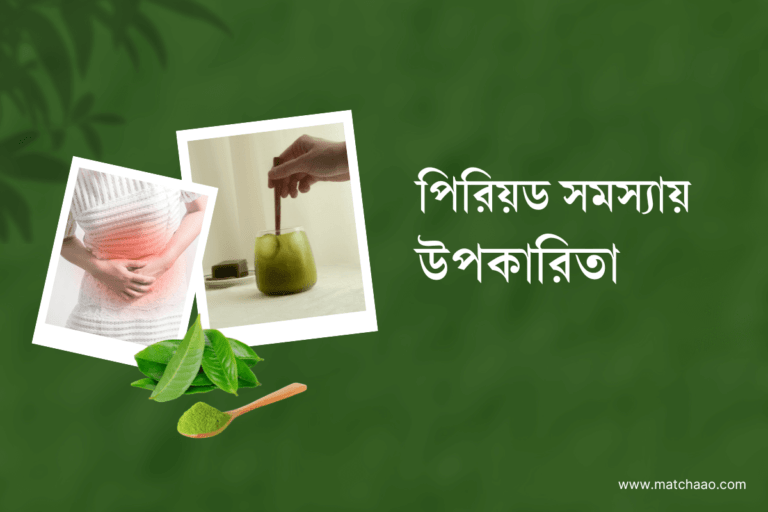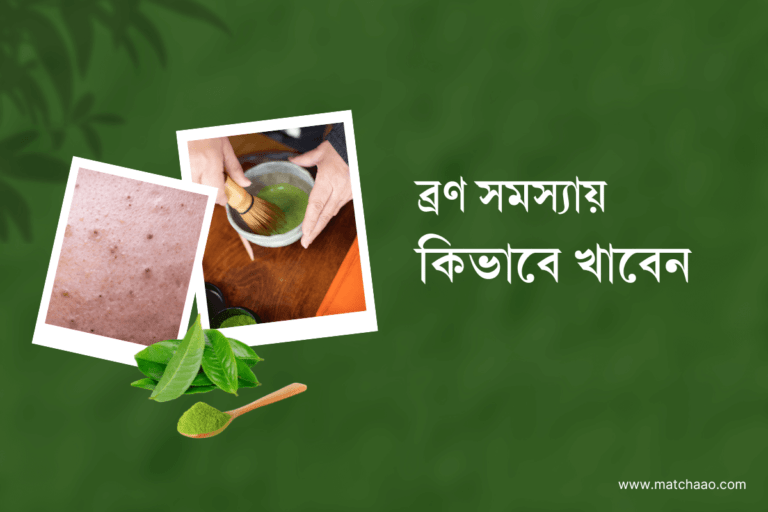Matcha Vs Coffee – 15 Reasons to Switch to Matcha
Being a caffeine addict takes you to the rollercoaster ride where headaches, sluggishness and dreaded withdrawals are constant.
But what if there was a better alternative?
Enter the debate of Matcha vs coffee. Matcha, the finely ground green tea powder that’s been revered for centuries in Japanese tea ceremonies.
While both contain caffeine, Matcha boasts a gentler energy boost with around 70mg per cup, in contrast to the 100-140mg found in coffee.
But here’s the kicker – Matcha’s unique combination of caffeine and other natural compounds provides a sustained release of energy, keeping you alert and focused for much longer than coffee ever could.

15 Compelling Reasons to Switch to Matcha
After extensive research we’ve compiled a list of science-backed facts that will make you switch to Matcha from your everyday coffee –
1. Matcha Gives You Jitter-Free Energy Boost
Worried about the jitters? Wave goodbye to wanted tremors by embracing Matcha as it offers a more gentle and sustained energy surge compared to coffee.
The holy grail combination of caffeine and L-theanine is going to keep you energized throughout the day without having the urge to hit the sack.[SA1] [Om2] Matcha contains L-theanine, an amino acid that promotes relaxation and reduces stress. When combined with caffeine, L-theanine provides a calm, focused energy without the jitters.
2. Matcha Increases Alertness and Focus[SA3]
This green tea has been proven to retain focus, helping you stay super productive and engaged without feeling anxious or distracted.
It can be also useful for chronic procrastinators and ADHD patients who can’t seem to focus on their tasks or get easily distracted.
Here again, the L-theanine present in matcha increases alpha waves in the brain, which makes you feel alert, focused, and conscious. When alpha waves are present, you can focus more clearly, stay alert longer, and have a wave of calmness wash over you. Over time, it can also aid in enhancing cognitive function and memory.
3. Matcha Soothes While Coffee Causes Tremors
Truth to be told, drinking coffee helps with brain fog but it comes with a price.
Due to the sudden surge in your nervous system you start to feel restless and it feels like your brain is always running and wandering through all kinds of thoughts at once.
With Matcha, the L-theanine amino acid helps to alleviate your nervous system through its relaxation properties. It boasts a sense of calmness and curbs your stress.
The concentration of natural amino acid breaks the blood-brain barrier, securing a feeling of calmness while reducing your overall stress. Providing a unique balance between relaxation and productivity, Matcha triumphs coffee.
4. More Antioxidant Than Your Regular Decaf Coffee
Among all the trending superfoods, Matcha green tea provides the highest level of antioxidants. No, we aren’t bluffing. To your surprise, there’s a test to back our statement.
According to the ORAC (Oxygen Radical Absorption Capacity) test, that gauges the antioxidant levels in foods, this green tea packs 1386 units per gram.
It’s 13x the antioxidants of pomegranates, 15x the antioxidants of blueberries and 125x that of spinach. Hate fruits? Don’t worry, Matcha green tea has your back!
5. Matcha Increases Your Brain Performance Better Than Coffee or Any Placebo Tea
In 2020, on November 26, a study was published by NLM (National Library of Medicine) where people were gathered to perform on a myriad of assessments to measure their brain performance.
While some participants took Matcha, the controlled group took a placebo tea.
Now, the participants went through a set of cognitive tests scrutinizing attention span, registering information, working memory and episodic memory.
The examiners figured that Matcha improved in attention, reaction time and memory compared to the placebo. [SA4]
6. It’s Time to Catch the Catechins
In case you didn’t know, catechins are a rare group of molecules that are extraordinarily potent and filled with antioxidants.
One of them is called EGCg, which boasts a significant percentage of the total catechins available in Matcha. No wonder, this magic molecule facilitates weight loss and promotes healthy brain and heart function.
7. Enhanced Detoxification
Here you may have a dispute with us that in no way Matcha does better in detoxification compared to coffee, given coffee can raise urine production and allow your body to flush out the toxins.
But have you ever wondered why people who are reliant on coffee are more prone to a toxic load than Matcha drinkers? Excessive intake of coffee equals excessive urination which brings us to dehydration.
With Matcha though, you have its high chlorophyll content which works as a natural detox, removing the harmful toxins and promoting a healthier liver function. You are getting the benefits minus the side effects.
No jitters, no dehydration. Why?
The caffeine present in Matcha is moderated by L-theanine helps reduce the potential risks of dehydration and offers a sustainable energy boost. In addition, the chlorophyll present in matcha binds to heavy metals and toxins, aiding in the removal of toxins.[SA5]
8. Matcha Is a Nutritional Powerhouse
Matcha is not only rich in antioxidants but also contains vitamins, minerals and amino acids. It provides a natural source of nutrients, including vitamin C, potassium and fiber.[SA6] [Om7]
At a glance,
| Nutrient | Amount per serving (1/2 tsp or 1 gr) |
| Protein | 306mg |
| Amino acids | 272mg |
| Lipids | 50mg |
| Potassium | 27mg |
| Magnesium | 2.3mg |
| Calcium | 4.2mg |
| Zinc | .062mg |
| phosphorus | 3.5mg |
| Iron | 1.7mg |
9. Matcha Creates Long-lasting Satiety Unlike Coffee
It offers a sustained energy boost without the jitters of coffee, reducing appetite and aiding weight loss.
Its caffeine content binds to larger plant molecules, affecting satiety. Matcha also increases leptin levels, a hormone associated with satiety.
Its unique ability to create a feeling of satiety is something you can benefit from in larger scale since it helps curb your craving. With its combination of caffeine and nutrients, it can keep you satisfied for longer, reducing the urge to snack.
10. Matcha Improves Your Oral Health While Coffee Deteriorates
Coffee’s acidity promotes bacteria growth, while Matcha, a green tea, helps prevent cavities by inhibiting bacteria and preventing plaque build-up.
Being super acidic, coffee produces bacteria faster than your local runner. If this wasn’t enough, the added sugar, whipped cream, milk (dairy or non-dairy) fast-forwards the bacterial penetration making your teeth wither overtime.
Switching to Matcha eliminates all these risks as well as strengthens your dental health.
11. Matcha Reduces O2 Stress Way Better Than Coffee
Now what is oxidative stress?
It happens when oxygen-free radicals overwhelm the body and damage cells, leading to a wide range of bodily impairments such as cancer, gene mutation, Parkinson’s disease, Alzheimer’s disease, heart failure, heart attack etc.
This is where Matcha is different. A research paper published by NLM revealed that matcha actively weeds out these molecules and neutralizes their fatal consequences. As severe as oxidative stress sounds, it’s also utterly feasible to prevent.[SA8] [Om9]
Just ensure incorporating constant supply of naturally occurring antioxidants (Matcha’s antioxidant supply is notably higher than coffee) in your diet.
12. Matcha Promotes Better Cholesterol
Guess what, drinking Matcha green tea can really help improve your cholesterol levels. Basically, it helps reduce the bad LDL cholesterol that can clog your arteries and increases the good HDL cholesterol that keeps your arteries healthy.
Consider HDL as your body’s cleanup crew, preventing issues like heart attacks or strokes.
13. Matcha for Arthritis
Unlike coffee, Matcha is a potent anti-inflammatory agent, making it potentially more beneficial for arthritis.
Green tea, including Matcha, may help reduce inflammation associated with conditions like arthritis, thanks to its catechin content.
While coffee can have some benefits, such as potentially protecting against gout symptoms, its impact on arthritis is less clear.
14. Matcha Makes You Remember!
The University of Basel in Switzerland did a study that showed drinking green tea improved people’s working memory and made their brains more effectively connected, which led to better cognitive performance.
People who drank Matcha did better on tests of short-term memory and had better brain function in the frontal and parietal lobes, according to the study.
15. With Matcha You Will Sleep Better
The natural chemicals in Matcha can put you into a deep and uninterrupted slumber while Coffee interferes with your sleep cycle.
As a sleep-promoting supplement, Matcha is good for you because L-theanine can help with worry and stress. Cortisol is a hormone that makes you feel alert and is part of your body’s stress reaction and L-theanine lowers its levels.
When cortisol levels are high, melatonin levels stay low.
A research made in 2019 found that people with generalized anxiety disorder who took L-theanine every day for 8 weeks had much better sleep quality.
End Quote
That’s a wrap for Matcha vs coffee debate. There’s no doubt that switching from coffee to Matcha can provide numerous health benefits, including a boost in metabolism and better attention without the jitters.
Even though the taste of Matcha can feel a bit underwhelming at first, slowly you will get the hang of it.
It is important to keep in mind that making a gradual transition can assist in alleviating withdrawal symptoms.
Every sip of Matcha that you take should serve as a reminder of the vigor and regeneration that comes with adopting new routines. May this shift bring you joy and satisfaction.






